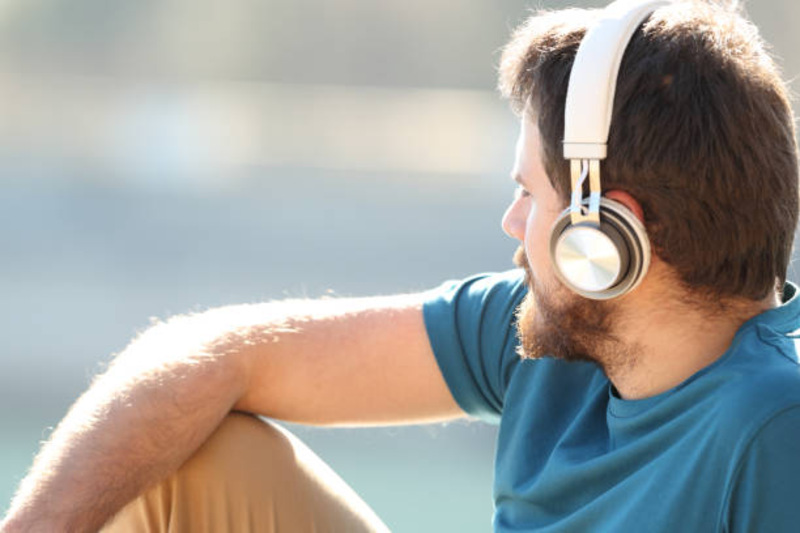Unveiling the Truth: Are Wireless Headphones Safe?
Feb 20, 2024 By Madison Evans
Wireless headphones have become quite popular, as they offer us the freedom to move around without being tethered to a device. But is this convenience worth the potential health hazards? With more studies emerging that suggest radiation from cell phones and other wireless devices can be concerning for our health, it's important to know if earbuds connected wirelessly may also pose a risk. In this blog post, we'll discuss available research on wireless headphone safety, what kind of signals these devices emit, and how you can stay safe while using them. Let's explore whether these common gadgets are actually danger lurking in plain sight!
What are Wireless Headphones?
Wireless headphones, also known as cordless or Bluetooth headphones, are headsets that communicate with your device through radio waves instead of a traditional 3.5mm audio cable. This technology enables users to move around freely while listening to music without worrying about tangling wires. The main benefit of wireless headphones is the convenience and freedom they provide us; however, there are some potential risks associated
How Do They Work?
Wireless headphones work by using Bluetooth to transmit data from your device to the earbuds. When you press play, the signal is converted into sound waves and transmitted directly to your headset, allowing you to listen without cables. This technology also allows for two-way communication; meaning, headphone controls such as adjusting volume can be sent back through the radio frequencies.
Electromagnetic Radiation Exposure:
One of the main concerns about wireless headphones is the exposure to electromagnetic radiation. Since Bluetooth operates on radio waves, wireless headphones emit a certain level of non-ionizing radiation. Some researchers argue that prolonged exposure to these types of electromagnetic fields could potentially lead to health issues such as headaches, cognitive impairment, or even increased risk of certain cancers. However, it's worth noting that the level of radiation emitted by Bluetooth devices is significantly lower compared to cell phones.
Impact on Sleep:
Wireless headphones, particularly those with active noise cancellation, often facilitate longer screen time, which can disrupt your sleep routine. This could also lead to insomnia or other sleep-related problems. Additionally, the sound waves emitted from wireless earbuds may interfere with your brain's ability to settle down and fall asleep.
Are There Safer Alternatives to Wireless Headphones:

For those looking for a safer option, wired headphones are always an excellent choice. Not only do they avoid radiation exposure, but they’re also more affordable and easier to maintain in the long run. If you’re still keen on using Bluetooth headphones, be sure to limit your usage and take regular breaks from listening. Additionally, if possible, try to avoid using them when you’re in bed or immediately before sleeping. Finally, try to use over-the-ear designs instead of in- ear headphones whenever possible, as this will reduce exposure to the inner ear and reduce the risk of hearing damage.
Responsible Practices for Using Wireless Headphones
The tips above, it’s important to practice responsible usage when using wireless headphones. Try to limit your exposure by keeping your device away from your body whenever possible and avoiding prolonged use. Additionally, avoid using these devices in areas with congested networks (i.e. airports or train stations), as this could potentially increase radiation exposure levels significantly.
How to Protect Yourself from Potential Health Risks While Using Wireless Headphones?

Though the potential health risks of wireless headphones may seem daunting, there are several simple steps you can take to protect yourself. As mentioned above, limiting your exposure is key; try not to use these devices for more than two hours at a time and always remember to take breaks. It’s important to keep your device away from your body whenever possible; try to hold it at least 20 cm away and make sure that the antenna (if your device has one) is pointing away from your head. Finally, if possible, opt for wired headphones over wireless ones whenever you can.
Tips for Minimizing Risk When Using Wireless Headphones:
- Limit usage - try not to use wireless headphones for more than two hours at a time
- Take breaks - take regular breaks while using them, and avoid using them before bed
- Choose wired over wireless - opt for wired headphones when possible, as they don't emit harmful radiation
- Opt for Over-Ear Headphones: Over-ear headphones are generally considered safer than in-ear headphones as they are further away from your brain, reducing the potential risk of radiation exposure.
- Turn off When Not in Use: When your wireless headphones are not in use, make sure to turn them off. This can help to reduce unnecessary exposure to electromagnetic fields.
- Use Lower Volume Settings: High volume levels can potentially lead to hearing damage over time. Aim to keep your volume under 60% of the maximum and avoid using headphones in noisy environments, where you might be tempted to increase the volume.
- Consider Devices with Lower SAR Values: The Specific Absorption Rate (SAR) is a measure of the amount of radio frequency energy absorbed by the body. When purchasing wireless headphones, consider devices that have lower SAR values.
- Regularly Update Your Headphones: Make sure your devices are always updated with the latest firmware. Manufacturers often release updates to improve efficiency, which can result in reduced radiation emissions.
- Consider Alternative Technologies: There are headphones available that use alternative technologies, such as air tube headphones. These can provide a safer option as they reduce the amount of electromagnetic radiation that is emitted close to the head.
Conclusion:
Wireless headphones can provide a convenient and comfortable listening experience, but there are potential health risks associated with them. To minimize these risks, it is important to practice responsible usage habits and consider alternative technologies when possible. Remember to always take regular breaks from using wireless headphones and opt for wired alternatives whenever possible. By following the tips outlined in this article, you can enjoy your wireless headphones safely and responsibly.
-
 Jul 10, 2024
Jul 10, 2024Bothered by Expression Lines? Here Are 10 Effective Tips to Eliminate Them
Discover effective methods to reduce expression lines and maintain youthful skin with these expert skincare tips and techniques.
-
 Nov 11, 2023
Nov 11, 2023What is cervical cancer?
This comprehensive article provides critical insights into cervical cancer, detailing risk factors, symptoms, prevention methods, and early detection strategies to combat this life-threatening disease.
-
 Jul 09, 2024
Jul 09, 20249 High-Protein Chicken Stir-Fries Loaded with Veggies
Explore a variety of flavorful and healthy chicken stir-fry recipes perfect for quick and nutritious dinners.
-
 Dec 22, 2023
Dec 22, 2023Understanding the Increased Risk of Depression and Suicide in Cancer Patients
Explore the increased risk of depression and suicide among cancer patients, why it happens, how to identify it, and ways to offer support.
